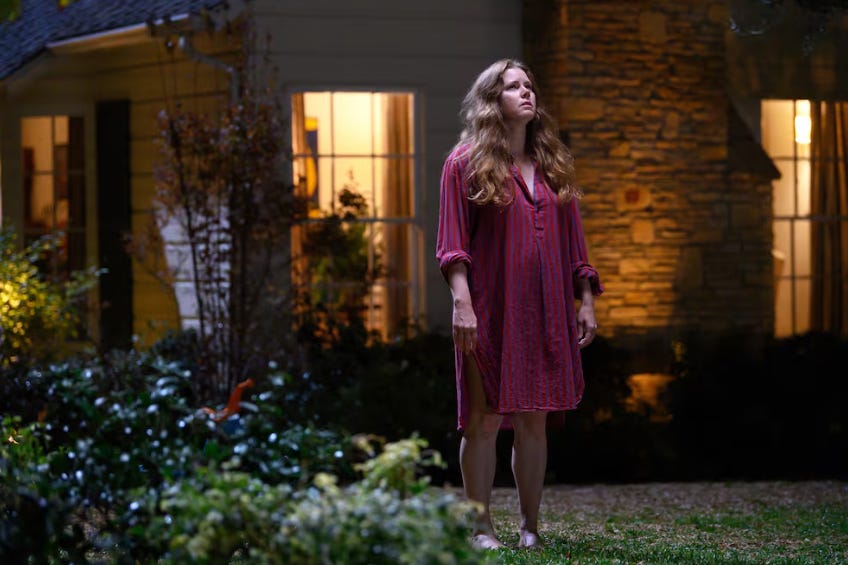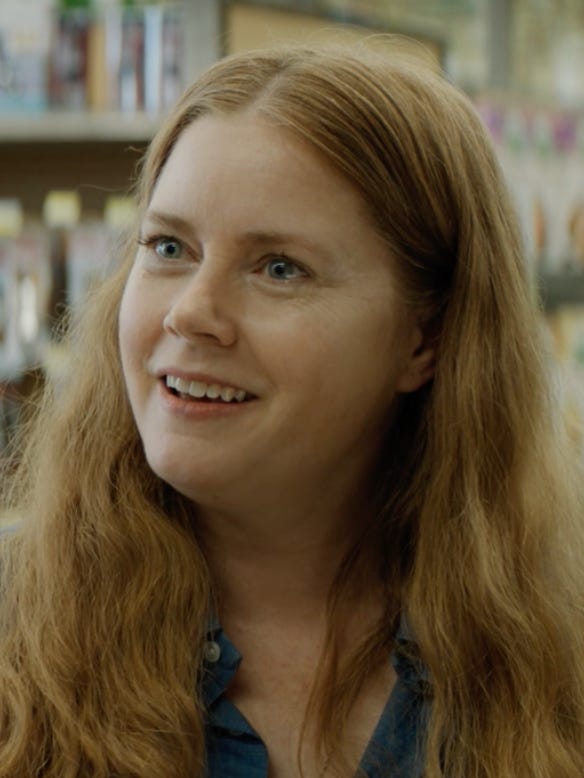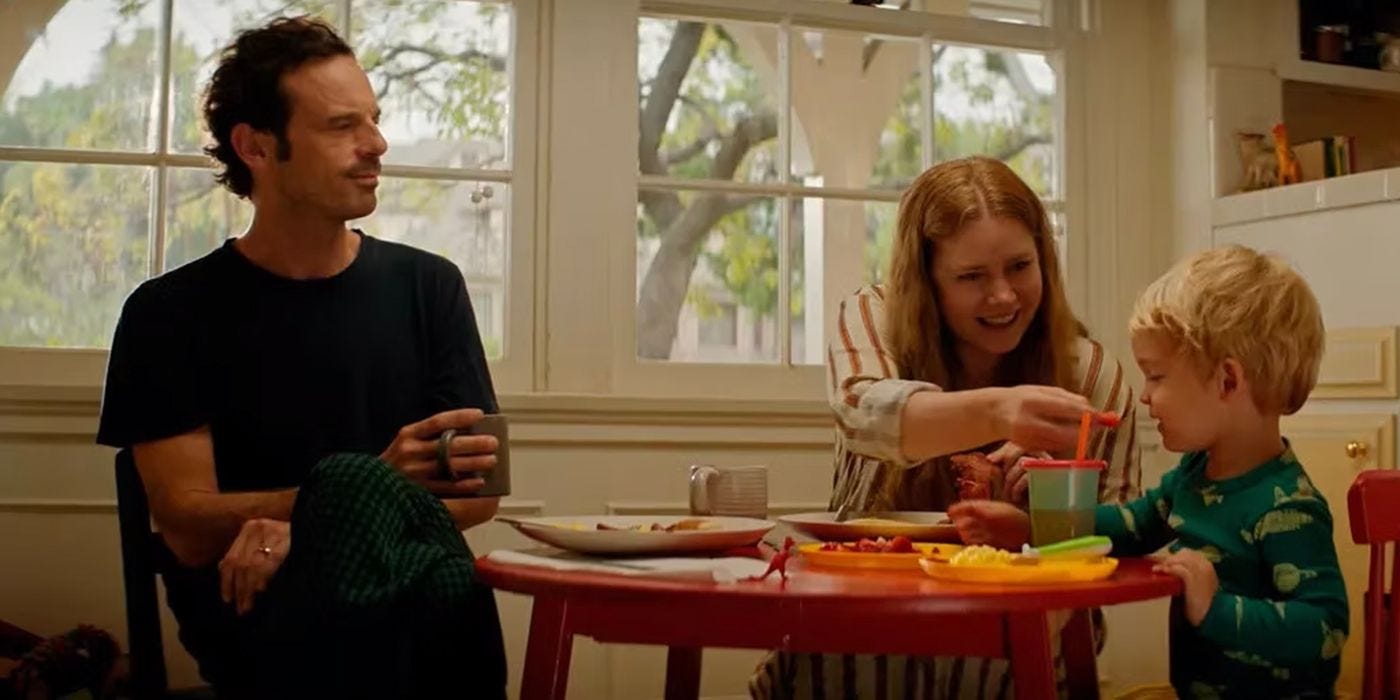Nightbitch Could've Been A Cult Classic
Amy Adams' new horror-comedy is more puppy than wolf.
On the tin, Nightbitch had the makings of a cult classic: an off-kilter tale of female rage told through the vessel of a stay-at-home mother (Amy Adams), who finds herself turning into a dog and roaming the streets with a pack of fellow hounds at night. It had the potential to be the coolest movie of the year. But nothing could have prepared me for how banal Nightbitch turned out to be.
Based on Rachel Yoder’s 2021 novel of the same name, in the movie we’re introduced to a world that is deliberately left vague. Set in an unidentified US city, we meet our unidentified family: “Mother”, who left her job as an artist to become a stay-at-home mum to her two-year-old “Son”, and “Husband” (Scoot McNairy), who is around occasionally but has a job that takes him away for most of the week.
Director Marielle Heller does a fantastic job at immersing viewers in the monotony of stay-at-home parenting, as we’re shown a long stretch of narrative where Mother’s days are bracketed by heating up the same sad frozen hashbrowns and struggling to put her child to bed. It’s enough to drive anyone out of their mind, and with body horror, there’s potential here to explore her festering emotions in a novel way.
Sadly, that potential is never realised. With a title like Nightbitch and the promise of body horror, I expected the kind of explosive female rage where heads were ripped off and bodies turned inside out. Instead, we’re stuck listening to Adams’ underwhelming monologues detailing why motherhood isn’t all it’s cracked up to be: from being physically torn apart during childbirth to the loss of identity and agency. (Perhaps having to hear Mother drone on and on about motherhood is the scariest part of this whole film.)
I expected the kind of explosive female rage where heads were ripped off and bodies turned inside out. Instead, we’re stuck listening to Adams’ underwhelming monologues detailing why motherhood isn’t all it’s cracked up to be.
The opening scene of the horror-comedy sees Mother unleash on an acquaintance on the reality of motherhood in a stretched out rant. “I feel like I’m just stuck inside a prison of my own creation, where I torment myself,” she says, before lamenting the loss of who she was before having a child. “I am deeply afraid that I am never going to be smart, or happy, or thin, ever again.” The audience soon realises this was an internal monologue, with Mother’s character choosing to say that she loves being a stay-at-home mum instead.
None of this is to say that these topics aren’t worthy of exploration. But by now, the idea of mothers not loving all aspects of motherhood or feeling regret isn’t as taboo as it was in the past. It’s possible the idea of exploring how difficult motherhood is for different classes or cultures or queer people could have offered more intrigue: for example, Kate Heany writes in Buzzfeed how ambivalence about motherhood as a queer woman isn’t an option.
Instead, we’re left watching this straight, white, middle-class woman live a life filled with resentment and anger while having nothing new to say. The overarching message is that while motherhood sucks a bunch of the time, it’s still the most important and selfless thing a woman can do: the ultimate act of sacrifice. How, Adams asks, is it possible to love something that physically rips you apart or has been cut out of your body?
In pushing the idea that being a mother is the ultimate achievement for women, it ignores that we don’t all have the same agency when it comes to having children. The decision is influenced by a multitude of factors, including geography, culture, sexuality and socioeconomic status. What about queer women, who have to shell out exorbitant amounts of money for a chance of pregnancy? Those who cannot get pregnant? How about those who adopt? Is their experience less worthy because their child didn’t come out of their body?
In pushing the idea that being a mother is the ultimate achievement for women, it ignores that we don’t all have the same agency when it comes to having children.
When Nightbitch does briefly move into the territory of body horror, it doesn’t go nearly far enough. After being driven over the edge by the reality of just how difficult motherhood can be, Mother gives into her primal urges and starts to believe she's transforming into a dog at night. While there was an opportunity here to play with some real gore and monstrousness, the metamorphic aspect of the movie is relatively timid, with Heller choosing to not alienate mainstream audiences. Beyond a couple of gross moments, it all feels a little too safe.
Ultimately, Heller’s film regurgitates a kind of platitudinous “you’re so brave” to the problems that mothers face. Could one of the reasons Mother is so alienated be because under the conditions of capitalism, the odds are stacked against parents who stay home? Because in the West, we lack the sort of collectivism that can give parents support? While Nightbitch sometimes hints towards harmful societal norms, it refuses to delve deeper into the systemic reasons why motherhood is so hard.
Besides, why are stories about women over the age of 40 so relentlessly about motherhood? All that’s doing is reinforcing that as women, mothers are all we’re destined to be. What then for women who choose not to have children? If motherhood is the ultimate act of sacrifice, then is childlessness the ultimate act of self-absorption? Unfortunately, that’s what Nightbitch is implying, and by now it’s a tired and divisive narrative.
In 2024, we deserve better than a movie that tells some of its audience that they’re less of a woman for not having kids. And mothers deserve more than a film about motherhood that ultimately has nothing new to say.
Rachel Choy is a cat lover, journalist, and co-founder of The Offcut. You can see how cute her cats are on @thekiwicouple.







